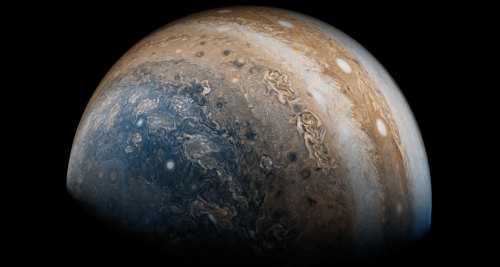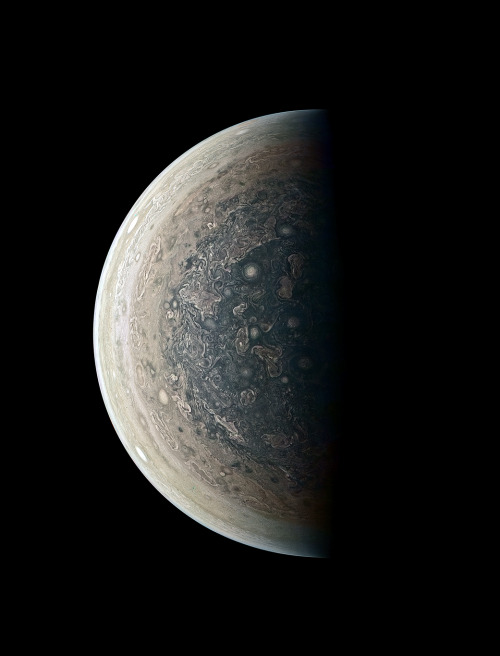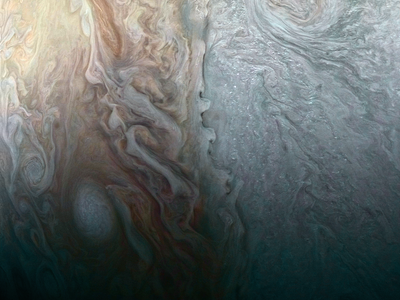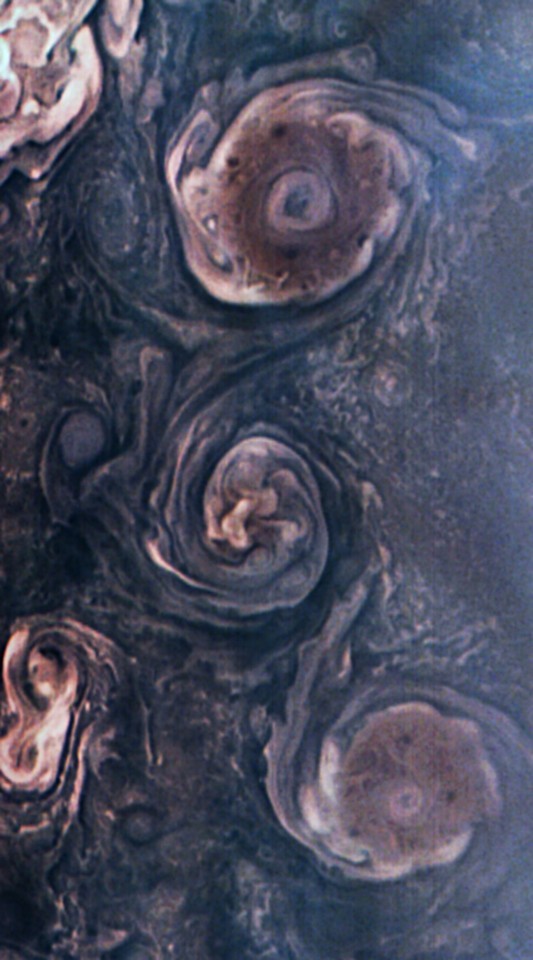Jupiter And Moons, January 24, 2014 By Hubble Heritage

Jupiter and Moons, January 24, 2014 by Hubble Heritage
More Posts from Starry-shores and Others
Stars, Sea, and Smoke from the ISS: Tournament Earth 2021
We started Tournament Earth with 32 photos taken by astronauts from the Interantional Space Station and now we are down to 8. All of the #1 seeds are gone. Two #8 seeds are dominating their groups. Who will win? Let's take a closer look at the competitors still in the game. Then remember to vote for your favorites. The champion will be announced on April 13, 2021.
Stars in Motion vs. Cleveland Volcano
This matchup pits smoke against stars, but both have interesting stories.

The International Space Station (ISS) is constantly in motion. For astronaut photographers on board, that motion has consequences. For one, it makes it challenging to take photos. The same motion makes it possible to shoot spectacular photos like the one above. The image is compiled from a series of photographs taken by astronaut Don Pettit while he was onboard the ISS in April 2012. This composite was made from more than 72 individual long-exposure photographs taken over several minutes as the ISS traveled over the Caribbean Sea, across South America, and over the South Atlantic Ocean.

Astronaut Jeff Williams was the first to witness activity at the Cleveland Volcano on May 3, 2006. The Cleveland Volcano is one of the most active in the Aleutian Islands, which extend west-southwest from the Alaska mainland. It is a stratovolcano composed of alternating layers of hardened lava, compacted volcanic ash, and volcanic rocks. The event proved to be short-lived; two hours later, the plume had completely detached from the volcano. The ash cloud height could have been as high as 6,000 meters (20,000 feet) above sea level.
Stargazing from the ISS vs. Cruising Past the Aurora Borealis
This is the most stellar matchup of the tournament, literally. Two beloved star pictures face off in what will be one of the most difficult choices of the tournament.

An astronaut took this broad, short-lens photograph of Earth’s night lights while looking out over the remote reaches of the central equatorial Pacific Ocean. The ISS was passing over the island nation of Kiribati at the time, about 2600 kilometers (1,600 miles) south of Hawaii. Scientists identified the pattern of stars in the photo as our Milky Way galaxy (looking toward its center). The dark patches are dense dust clouds in an inner spiral arm of our galaxy; such clouds can block our view of stars toward the center. The curvature of the Earth crosses the center of the image and is illuminated by a variety of airglow layers in orange, green, and red.

Commonly known as the northern lights, these colorful ribbons of light appear to dance in the sky over the planet’s high latitudes, attracting sky chasers and photographers. Astronaut Randy “Komrade” Bresnik shot this photograph on September 15, 2017, as the space station passed over Ontario, Canada. Curtains of green—the most familiar color of auroras—dominate the light show, with hints of purple and red.
Rolling Through the Appalachians vs. Castellanus Cloud Tower

The Susquehanna River cuts through the folds of the Valley-and-Ridge province of the Appalachian Mountains in this photograph taken from the International Space Station by astronaut Christina Koch. The Valley-and-Ridge province is a section of the larger Appalachian Mountain Belt between the Appalachian Plateau and the Blue Ridge physiographic provinces. The northeast-southwest trending ridges are composed of Early Paleozoic sedimentary rocks. The valleys between them were made of softer rocks (limestone and shales) that were more susceptible to erosion; they are now occupied by farms.

An astronaut aboard the International Space Station took this photograph of a massive vertical cloud formation—known to meteorologists as cumulus castellanus—above Andros Island. The cloud name castellanus comes from the similarity to the crenellated towers or turrets of medieval castles. These clouds develop due to strong vertical air movement typically associated with thunderstorms.
Lake Van, Turkey vs. Typhoon Maysak from the Space Station

While orbiting on the International Space Station, astronaut Kate Rubins shot this photograph of part of Lake Van in Turkey, the largest soda or alkaline lake on Earth. Generally, soda lakes are distinguished by high concentrations of carbonate species. Lake Van is an endorheic lake—it has no outlet, so its water disappears by evaporation—with a pH of 10 and high salinity levels.

This photograph of super typhoon Maysak was taken by European Space Agency astronaut Samantha Cristoforetti as the International Space Station passed near the storm on March 31, 2015. The category 4 typhoon was headed for a possible landfall in the Philippines by the end of the week. It was unusual for the western Pacific to see such a strong storm so early in the year.
See all of the images and vote HERE. Follow @NASAEarth on social media for updates.
Make sure to follow us on Tumblr for your regular dose of space: http://nasa.tumblr.com
Incredible view of Fanjingshan or mount Fanjing, Guizhou, China
Guizhou, China 😍✈️
viajarbaratoemelhor
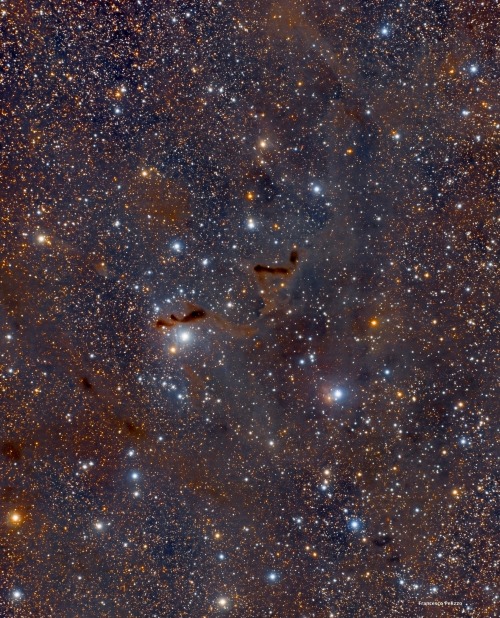
A Giving Hand, vdB9 // DocRx
from Asimov’s ‘Nightfall’
Here’s a great explanation of language usage in sci-fi literature for all those who cannot keep their nit-picking to themselves:
Kalgash is an alien world and it is not our intention to have you think that it is identical to Earth, even though we depict its people as speaking a language that you can understand, and using terms that are familiar to you. Those words should be understood as mere equivalents of alien terms-that is, a conventional set of equivalents of the same sort that a writer of novels uses when he has foreign characters speaking with each other in their own language but nevertheless transcribes their words in the language of the reader. So when the people of Kalgash speak of “miles,” or “hands,” or “cars,” or “computers,” they mean their own units of distance, their own grasping-organs, their own ground-transportation devices, their own information-processing machines, etc. The computers used on Kalgash are not necessarily compatible with the ones used in New York or London or Stockholm, and the “mile” that we use in this book is not necessarily the American unit of 5,280 feet. But it seemed simpler and more desirable to use these familiar terms in describing events on this wholly alien world than it would have been to invent a long series of wholly Kalgashian terms.
In other words, we could have told you that one of our characters paused to strap on his quonglishes before setting out on a walk of seven vorks along the main gleebish of his native znoob, and everything might have seemed ever so much more thoroughly alien. But it would also have been ever so much more difficult to make sense out of what we were saying, and that did not seem useful. The essence of this story doesn’t lie in the quantity of bizarre terms we might have invented; it lies, rather, in the reaction of a group of people somewhat like ourselves, living on a world that is somewhat like ours in all but one highly significant detail, as they react to a challenging situation that is completely different from anything the people of Earth have ever had to deal with. Under the circumstances, it seemed to us better to tell you that someone put on his hiking boots before setting out on a seven-mile walk than to clutter the book with quonglishes, vorks, and gleebishes.
If you prefer, you can imagine that the text reads “vorks” wherever it says “miles,” “gliizbiiz” wherever it says “hours,” and “sleshtraps” where it says “eyes.” Or you can make up your own terms. Vorks or miles, it will make no difference when the Stars come out.
-I.A.
-R.S.

Picos de Europa, Spain - by Arturo Garcia

Cover design for an Italian reprint of Isaac Asimov’s “Foundation Trilogy” by Gabriel Björk Stiernström.
-
 anderwhohn-moved reblogged this · 4 years ago
anderwhohn-moved reblogged this · 4 years ago -
 emogination liked this · 4 years ago
emogination liked this · 4 years ago -
 deadboiiiiiii69 liked this · 4 years ago
deadboiiiiiii69 liked this · 4 years ago -
 ladawnasworld liked this · 4 years ago
ladawnasworld liked this · 4 years ago -
 sickboii310 liked this · 4 years ago
sickboii310 liked this · 4 years ago -
 electric-bird-you-are-art liked this · 4 years ago
electric-bird-you-are-art liked this · 4 years ago -
 parcspace liked this · 4 years ago
parcspace liked this · 4 years ago -
 rosecoloredthey liked this · 4 years ago
rosecoloredthey liked this · 4 years ago -
 savesomeforus liked this · 4 years ago
savesomeforus liked this · 4 years ago -
 linguinicool liked this · 4 years ago
linguinicool liked this · 4 years ago -
 alienlamp liked this · 4 years ago
alienlamp liked this · 4 years ago -
 onthesun18 reblogged this · 4 years ago
onthesun18 reblogged this · 4 years ago -
 krhtikosbobmarley liked this · 4 years ago
krhtikosbobmarley liked this · 4 years ago -
 lordtableshark reblogged this · 4 years ago
lordtableshark reblogged this · 4 years ago -
 cucoola liked this · 4 years ago
cucoola liked this · 4 years ago -
 amalgamata reblogged this · 4 years ago
amalgamata reblogged this · 4 years ago -
 christianbozyk liked this · 4 years ago
christianbozyk liked this · 4 years ago -
 santilupresents reblogged this · 4 years ago
santilupresents reblogged this · 4 years ago -
 santilupresents liked this · 4 years ago
santilupresents liked this · 4 years ago -
 demonwin62 liked this · 4 years ago
demonwin62 liked this · 4 years ago -
 xanaxswallower liked this · 4 years ago
xanaxswallower liked this · 4 years ago -
 saltypeachsong liked this · 4 years ago
saltypeachsong liked this · 4 years ago -
 jollyeggsmakerdiplomat-blog liked this · 4 years ago
jollyeggsmakerdiplomat-blog liked this · 4 years ago -
 dankjellybean reblogged this · 4 years ago
dankjellybean reblogged this · 4 years ago -
 thebizza reblogged this · 4 years ago
thebizza reblogged this · 4 years ago -
 bennedeto reblogged this · 4 years ago
bennedeto reblogged this · 4 years ago -
 bennedeto liked this · 4 years ago
bennedeto liked this · 4 years ago -
 aceonthehotmessexpress liked this · 4 years ago
aceonthehotmessexpress liked this · 4 years ago -
 michael-rocket liked this · 4 years ago
michael-rocket liked this · 4 years ago -
 hedonistom liked this · 4 years ago
hedonistom liked this · 4 years ago -
 pjv-ohsjd-pt liked this · 4 years ago
pjv-ohsjd-pt liked this · 4 years ago -
 gaiawatcher liked this · 4 years ago
gaiawatcher liked this · 4 years ago -
 xendrassk liked this · 4 years ago
xendrassk liked this · 4 years ago -
 thatsummersomeyearsago reblogged this · 4 years ago
thatsummersomeyearsago reblogged this · 4 years ago -
 thatsummersomeyearsago liked this · 4 years ago
thatsummersomeyearsago liked this · 4 years ago -
 jayoheeleyee liked this · 4 years ago
jayoheeleyee liked this · 4 years ago

Amateur astronomer, owns a telescope. This is a side blog to satiate my science-y cravings! I haven't yet mustered the courage to put up my personal astro-stuff here. Main blog : @an-abyss-called-life
212 posts



